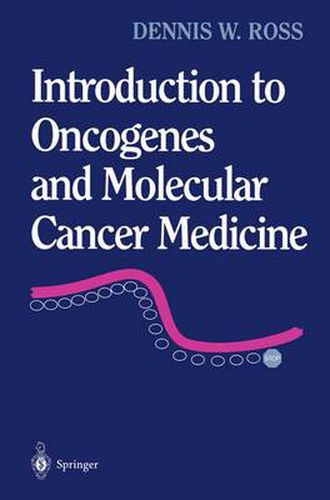Readings Newsletter
Become a Readings Member to make your shopping experience even easier.
Sign in or sign up for free!
You’re not far away from qualifying for FREE standard shipping within Australia
You’ve qualified for FREE standard shipping within Australia
The cart is loading…






This title is printed to order. This book may have been self-published. If so, we cannot guarantee the quality of the content. In the main most books will have gone through the editing process however some may not. We therefore suggest that you be aware of this before ordering this book. If in doubt check either the author or publisher’s details as we are unable to accept any returns unless they are faulty. Please contact us if you have any questions.
Scientists now understand that cancer is a genetic disease and cutting -edge molecular therapies are making their way from the laboratory into clinical practice. Introduction to Oncogenes and Molecular Cancer Medicine provides the physician with a solid understanding of molecular biology and its applications for the diagnosis and treatment of cancer. The book reviews the basic molecular principles and the basic principles of cancer medicine, including controls of cell growth and senescence, carcinogenesis, tumorogenesis, and epidemiology. The second part of the book gives clinical examples to demonstrate the basic science principles, including chapters on leukemia, colon cancer, and breast cancer. A chapter on molecular diagnostics and screening plus a chapter on new molecular anti-cancer therapies give the reader a look at current cutting-edge therapies as well as as the future of molecular cancer medicine. A useful glossary defines new terminology at-a-glance. Introduction to Oncogenes and Molecular Cancer Medicine is for all physicians seeking a better understanding of the modern molecular principles of cancer medicine. Written in a user-friendly, conversational format, this text will be welcomed by all physicians eager to sharpen their own understanding of molecular cancer medicine as well as to help them provide patients with balanced information on the advances and limitations of current treatment options.
$9.00 standard shipping within Australia
FREE standard shipping within Australia for orders over $100.00
Express & International shipping calculated at checkout
This title is printed to order. This book may have been self-published. If so, we cannot guarantee the quality of the content. In the main most books will have gone through the editing process however some may not. We therefore suggest that you be aware of this before ordering this book. If in doubt check either the author or publisher’s details as we are unable to accept any returns unless they are faulty. Please contact us if you have any questions.
Scientists now understand that cancer is a genetic disease and cutting -edge molecular therapies are making their way from the laboratory into clinical practice. Introduction to Oncogenes and Molecular Cancer Medicine provides the physician with a solid understanding of molecular biology and its applications for the diagnosis and treatment of cancer. The book reviews the basic molecular principles and the basic principles of cancer medicine, including controls of cell growth and senescence, carcinogenesis, tumorogenesis, and epidemiology. The second part of the book gives clinical examples to demonstrate the basic science principles, including chapters on leukemia, colon cancer, and breast cancer. A chapter on molecular diagnostics and screening plus a chapter on new molecular anti-cancer therapies give the reader a look at current cutting-edge therapies as well as as the future of molecular cancer medicine. A useful glossary defines new terminology at-a-glance. Introduction to Oncogenes and Molecular Cancer Medicine is for all physicians seeking a better understanding of the modern molecular principles of cancer medicine. Written in a user-friendly, conversational format, this text will be welcomed by all physicians eager to sharpen their own understanding of molecular cancer medicine as well as to help them provide patients with balanced information on the advances and limitations of current treatment options.